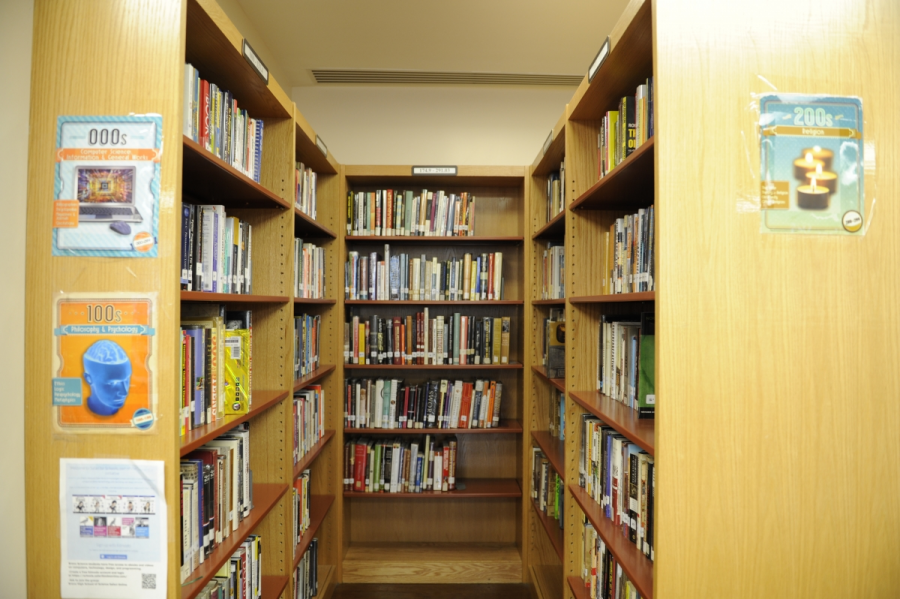Students are Undervaluing Libraries
The Computer Science and Philosophy & Psychology shelves of the school library.
Today, Bronx Science students are notorious for doing homework on computers and playing phone games in the school library. In many cases, I sympathize with the average student’s desire to finish homework and relax with friends in a school that has a heavy workload. Our school is also supporting the well-being of its students by providing us with the resources we need, such as computers and printers.
However, at the same time, libraries all across the nation are in danger of being undervalued, downgraded, and transformed. Some see traditional libraries as obsolete; it is no longer worth the trip if books are accessible online. Some simply do not value reading books anymore. Yet, libraries are in fact more relevant in the age of technology because of the nature of their public accessibility and their enduring academic reputation.
To bring to light this issue, it is important to recognize why people should be concerned about this social phenomenon. Libraries are more than rooms with shelves of books. Libraries are symbolic of the democratization of education and the indestructible value of classics and primary texts. They represent the cyclical process of ideas in the pursuit of free speech. They reveal the great lengths that our species has reached in knowledge, including but not limited to essays re-evaluating human society, journals reporting scientific research, novels portraying the realities of human condition, and fictional books experimenting with human imagination.

“Rad American Women A-Z,” a book in the school library our students might be interested in reading.
To assess the importance of reading itself, the process of obtaining new knowledge is crucial to our lives, because it allows us to prepare for the world around us. Reading critically is essential to participating in discourse in education. Interpretation and reiteration are skills that improve communication, thus benefiting one’s experience in higher education and a career.
Moreover, academics recognize the need to be up-to-date with the academics of the past. “Each day, students sit in a room surrounded with words and teachings from the greatest philosophers, theorists, and thinkers in history, yet they might as well be sitting in an empty room,” Ms. Kim, one of Bronx Science’s librarians, pointed out. “Those who do not read and explore outside their ken are missing the richness and bounty of life. The ability to learn and to change comes from accessing ideas and teachings of wise humans who have come before us, and who are in the world now.”
However, libraries face many complications today. Library usage is falling. Libraries are closing around the world. Libraries are not receiving as much funding as they previously did. According to the Pew Research Center, the percentage of adults in America who visited a library in the past year dropped from 53% to 44% from 2012 to 2015. The same report also found that many adults were unaware of the key educational resources available at public libraries. Another Pew report in 2018 showed that 24% of American adults were non book-readers (including digital books). Additionally, according to BBC, 343 libraries closed in the UK in 2016 due to decreased government spending, and the number of paid staff in libraries decreased a staggering 25%.

Student doing homework on a table in the school library.
Even at Bronx Science, change is evident. “I still do see students reading in the library, but not as frequently as before,” librarian Ms. Sweis said. Both librarians at Bronx Science speculated as to the reason for the decline in the number of students reading. Ms. Sweis spoke about the NYC DOE policy that allows cell phones in school, and Ms. Kim spoke about the new digital entertainment age. “Texting, social media, movies, games, and so on, are all distractions that take away from our lives,” Ms. Kim said.
“Texting, social media, movies, games, and so on, are all distractions”
Yet, is technology to blame for threatening libraries? Admittedly, the age of internet has achieved much in the past few years. It has revolutionized the means of communication and learning and has brought an entirely new system of entertainment and media to people. However, with the change in means of communication and data, the benefits of technological access are hindered with the ridiculous distractions that it offers. “If not used responsibly, technology becomes a distraction and a substitute for real life engagement and discussion. I can understand using it as a stress relief, but there must be a balance,” Ms. Sweis said.

Romaim Hernandez ’20 enjoying “Subliminal: How Your Unconscious Mind Rules Your Behavior” by Leonard Mlodinow in Bronx Science’s Book Club.
Other reasons may be that students feel more comfortable reading online from home. In the age of digitized media, e-books are widely available on library websites to borrow or download. “The way you read should be comfortable for you,” an anonymous student from a sophomore Rhetoric and Composition class said. Although that is perfectly reasonable, reading online is more subject to internet distraction than reading physical book copies. However, it is still better than not reading at all.
As members of the generation significantly impacted by digital media and technology, we must recognize and uphold the action of reading books. Moreover, as students, we need to continue to be aware of our surroundings and be constant learners. In respect of true equal access to education and learning resources, we must also support funding to libraries. I understand that Bronx Science students are extremely busy with work, but I urge students to check out a book from the school library one day. Visit the research library at Bryant Park for a research project. Check out the online facilities of the New York Public Library website. Go in the summertime. It will be most rewarding.
Alysa Chen is an Editor-in-Chief for ‘The Science Survey’ and an Academics Section Reporter for ‘The Observatory.’ She enjoys journalistic writing...

